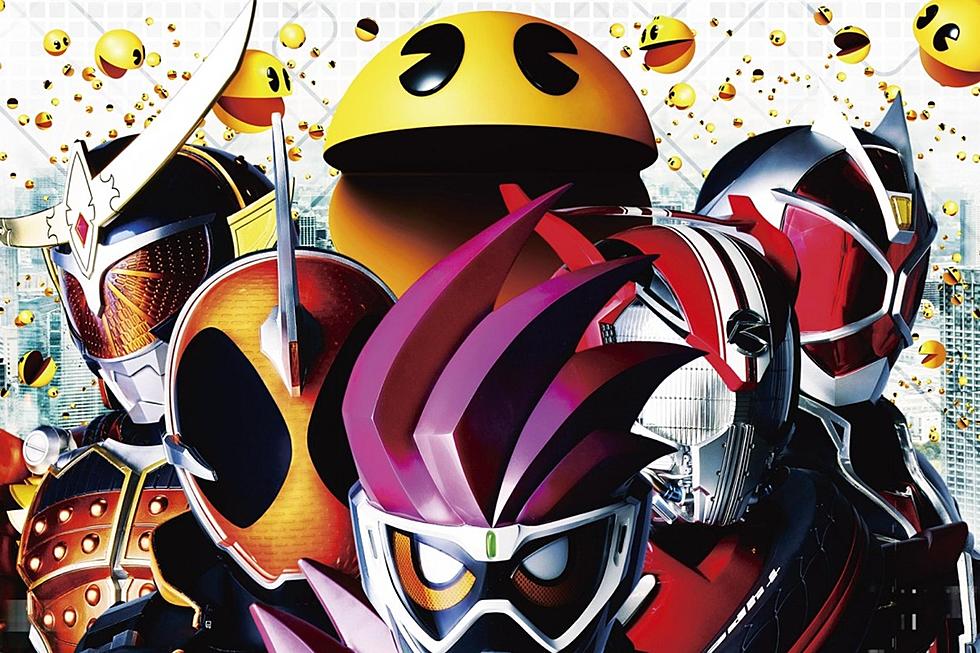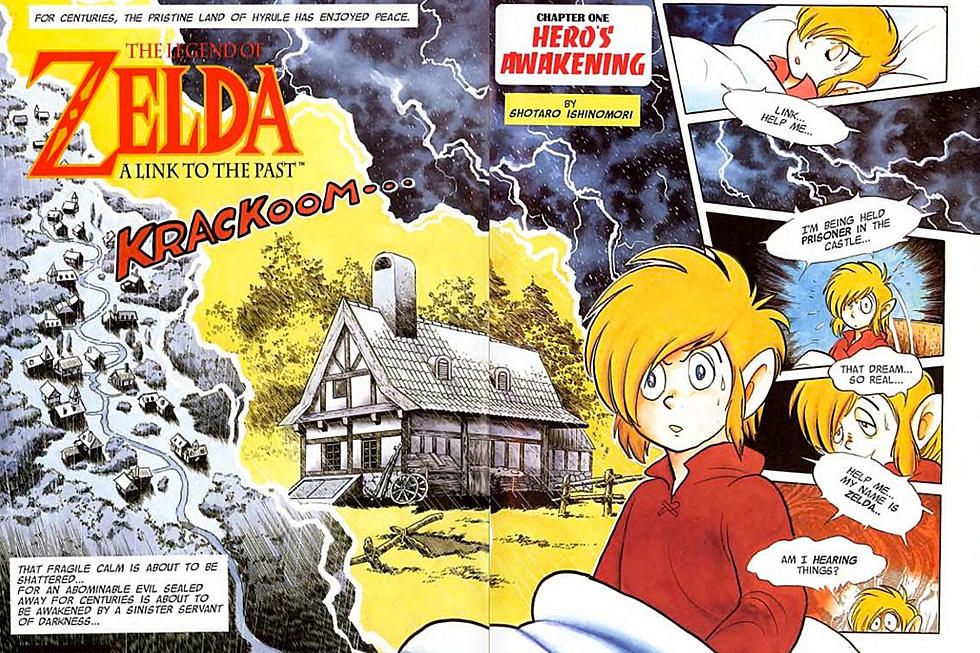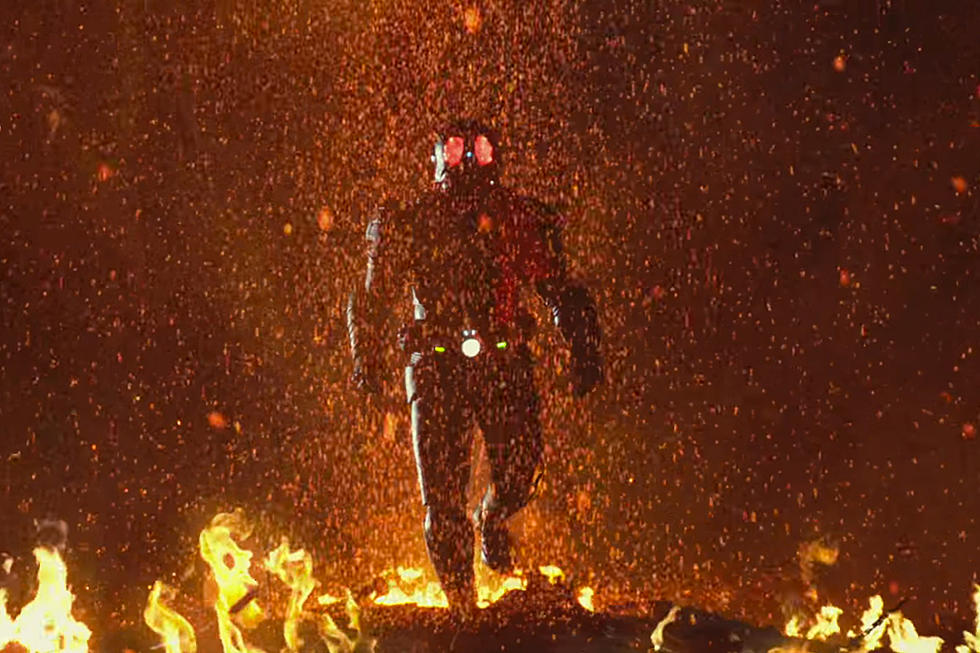
Ask Chris #166: Kamen Rider Fourze Is Better Than Your Favorite Superhero
Q: Can you tell us about Kamen Rider Fourze? I understand if it's too painful to discuss. -- @Desgardes
A: Kamen Rider Fourze is the single best piece of superhero mass media in the past ten years. And considering that the past ten years also brought us stuff like The Dark Knight, Batman: The Brave and the Bold and that Avengers movie that everybody likes, that's no small thing for me to say.
As for how I know this -- and why Des here refers to it as a painful subject -- it's because the final episode of Kamen Rider Fourze made me cry harder than anything else I've ever seen. That last episode of Brave and the Bold put tears in my eyes, yes, but Fourze had me sobbing so hard that my neighbors started building an ark and gathering up all the beasts of the land in pairs lest my tears cause a flood that wiped away the sins of man.
Before I get into the specifics about Fourze, I should probably explain that a little bit. It's not that I'm the type of person who never really gets emotional about superhero stories. If anything, I'm one of the easiest people in the world to get tears out of, as long as I'm reading a very specific kind of story. You know WE3, Morrison and Quitely's tearjerker about a dog, cat and bunny rabbit that are turned into cybernetic killing machines and then rebel against their programming, escaping and searching for a home? That's a great comic and I really love it, but it's not one that really sets me to weeping, even when the dog starts talking about how "home is run no more." You drop Morrison and Porter's JLA in front of me and go to the part where everyone in the world gets superpowers and they all decide as one to rise up and help Superman defeat Mageddon the Anti-Sun, because they understand that he always uses his powers to help them, and in that one moment everyone in the entire world is Superman?
Aw jeez. I'm misting up right now just thinking about it. I'm not even kidding. Gimme a sec here.
It's tough to explain why stuff like that just gets me right in the heart, but it boils down to the idea that superheroes are a fundamentally optimistic proposition. They all descend from Superman, a character who's built around the idea that this person with powers and abilities far beyond those of mortal men would use them exclusively for the benefit of others. Batman suffers a tragedy and dedicates his life to preventing it from happening to others. Spider-Man commits one act of selfishness -- not even selflishness, but just not helping someone -- and suffers for it, then atones for it a million times over the rest of his life. That's what these stories are about at their core, and as much as they're meant to entertain rather than instruct, they carry that lesson to their readers, too. "With great power comes great responsiblity" isn't just something Peter Parker learns, it's something that he teaches, and there's a good reason why "Do good to others and every man can be a Superman" is the single best panel in that character's 75-year history.
That's what really sticks with me about superheroes, and why you'll find a hundred columns right here on ComicsAlliance where I obsess over matters of heroic morality. It's why I'm fascinated with what Jack Kirby did with the idea of a god of war in a cosmology where war wasn't something to be worshipped. It's why I will argue 'til I'm blue in the face about how Captain America isn't a soldier and doesn't kill people even during the war, and why I think the imagery of a man who charges onto the battlefield carrying a shield instead of a gun is so important, even if he does, you know, use that shield to bash dudes upside the head. I have a very specific view of superheroism as something that we should be meant to aspire to. They have to be better people, because they serve to inspire us to be better people.
Kamen Rider Fourze takes that idea, boils it down to its purest form, and makes it the center of every single thing that happens in the show.
I'll get back to that in a second. First, a few basics: When I watched Fourze, I was already getting into Kamen Rider as a franchise with Shotaro Ishinomori's original manga. For all my pretensions of the grand aspirational mythology of superheroes, I also sometimes just really like comics where monsters get jumpkicked to death by dudes on dirtbikes, and as the 40th anniversary installment of the series ("Fourze" = Four + Zero, geddit?), Fourze delivers on that front, too. One of the brilliant things about the series is that they somehow managed to make the most toyetic main character they could while still doing it in a pretty fascinating way.
Here's the short version: Each Kamen Rider has a belt (or "driver") that they use to transform and get their super-powers. In 2009's Kamen Rider W (which is pronounced "Double," not "Double-You"), the lead character had a belt with two slots that gave him two powers at once and a nifty two-tone costume. 2010's Kamen Rider OOO (pronounced "Oz," rhymes with "those") had three slots that he could drop circular coins into (geddit?) in order to get three different animal powers at once. Fourze follows that up with a belt with four slots for "Astro Switches" that can be swapped out, with each slot corresponding to one of his limbs, so that he can have four powers at a time.
Two reasons why this is pure genius. 1) There are a total of forty switches, which means that they can sell you an action figure and then sell you packs of various super-powers as accessories. 2) When Fourze jumpkicks a monster, he does it with a gigantic rocket-powered drill on his foot.
He also has a chainsaw foot, a missile launcher foot, and just a straight up flamethrower that makes a firetruck noise. It's pretty awesome, just in terms of lending itself to action that's fun to watch. But for what makes it great, it all goes back to those ideas of morality and inspiration.
The show is focused on a group of students attending Amanogawa High, a school with a minor but persistent problem: Someone is giving students "Zodiart Switches" that turn them into constellation-themed monsters and allow them to live out the revenge fantasies that come with their teenage problems. The football player who was benched for the whole season, the girl who's jealous of her friend, the kids who feel alone and ostracized, those are the ones singled out and given the ability to turn into Zodiarts, with the twelve Horoscopes lurking behind them with a sinister plan.
In order to stop them, a transfer student named Kisaragi Gentarou takes up the Fourze Driver that was cooked up on a moon base (long story) by the antisocial Kengo and their mutual friend, Yuuki. He does the fighting and they all work together to stop the Zodiarts. In that respect, the first half of the series plays out like a slightly more action-oriented version of Buffy the Vampire Slayer, but with Joss Whedon's snappy pop culture patter replaced with Yuuki singing songs about her favorite satellites. But the thing is, even though he's the one fighting the monsters with his chainsaw foot, Gen isn't a character who's defined by combat.
He's defined by friendship.
Gen's entire goal in life -- bluntly stated in the first episode and then repeated, just as bluntly, as the series goes on -- is to become friends with everyone. His entire relationship with Kengo, in fact, which grows over the course of the series to have the kind of emotional resonance that other shows have tried and failed to create, is based on the idea that Kengo doesn't like him, so Gen's going to be the best friend he can, because being a friend when it's easy isn't really being a friend at all.
It's a small thing, and "friendship-based superheroics" might sound like the kind of thing that would only appeal to an audience of children -- which is, you know, the audience that the show is meant for -- but Fourze pulls it off. The key is that Gentarou's devotion to friendship never wavers, not even when he fights the monsters. Like the best Superman stories, he doesn't want to beat them, he wants to help them.
That kid who was mad about being kicked off the football team and turned into Orion to wreck the school?
And that's something that happens throughout the show. Fourze (the show and the character) is miles ahead of anything else I've seen in terms of casting the villains as actual people, driven to what they've done because they have problems. It gives us a show where the hero tries to understand and help them rather than just kick them until they explode, and brings with it the hope that if we can just realize that we're not so different, maybe we wouldn't have to fight anymore. I don't want to spoil anything for anyone who seeks it out, but even the ending has that ring to it, where every single thing that happens is based around a desire to use power to help others, even when it's twisted around.
Eventually, the show reaches a point where the students-becoming-monsters plot stops, but it happens as a natural progression. Even then, that stuff is replaced in the story with an interesting explanation of what friendship means to all the characters, how they view loyalty, and -- no joke -- the destiny of humanity and how we won't be able to reach it if we don't come together. And it's all happening through a the medium of superheroic battles.
There's definitely a silliness to it, but the show doesn't shy away from it, and instead presents it with a complete lack of cynicism that's both refreshign and effective in building the emotional connections between the characters. It does it elegantly, too. This is a show where -- huge massive spoiler warning, by the way -- the main character is literally betrayed and murdered by one of his friends, is then resurrected by the power of friendship and forgives the person who killed him, and manages to do that without even an ounce of the terrible, hamfisted Christ imagery that you get in Superman Returns or Man of Steel. And it has a maturity, an honesty and a confidence in what it is that those soulless, embarrassing projects lacked.
There's a bunch of other great stuff about the show, too. The way the moon base changes to reflect the personalities of the students who join up with Gentarou's Kamen Rider Club, the recurring themes and the way that everything is brought back for the climax, that sequence of four or five episodes where Fourze is basically fighting the Joker. It's good stuff.
Unfortunately, it's also not really available in America, presumably because the attempt to import Kamen Rider as a spin-off of the American version of Ishinomori's other famous creation, the Power Rangers, was what you might call an unwatchable mess that tanked pretty hard. The closest Kamen Rider has come since was in 2009 with Kamen Rider: Dragon Knight on CW4Kids. But if you want to see what it looks like in that rare occasion when a superhero show is both completely unashamed of itself and also extremely well done, it's worth seeking out.
Ask Chris art by Erica Henderson. If you’ve got a question you’d like to see Chris tackle in a future column, just send it to @theisb on Twitter with the hashtag #AskChris.
More From ComicsAlliance









